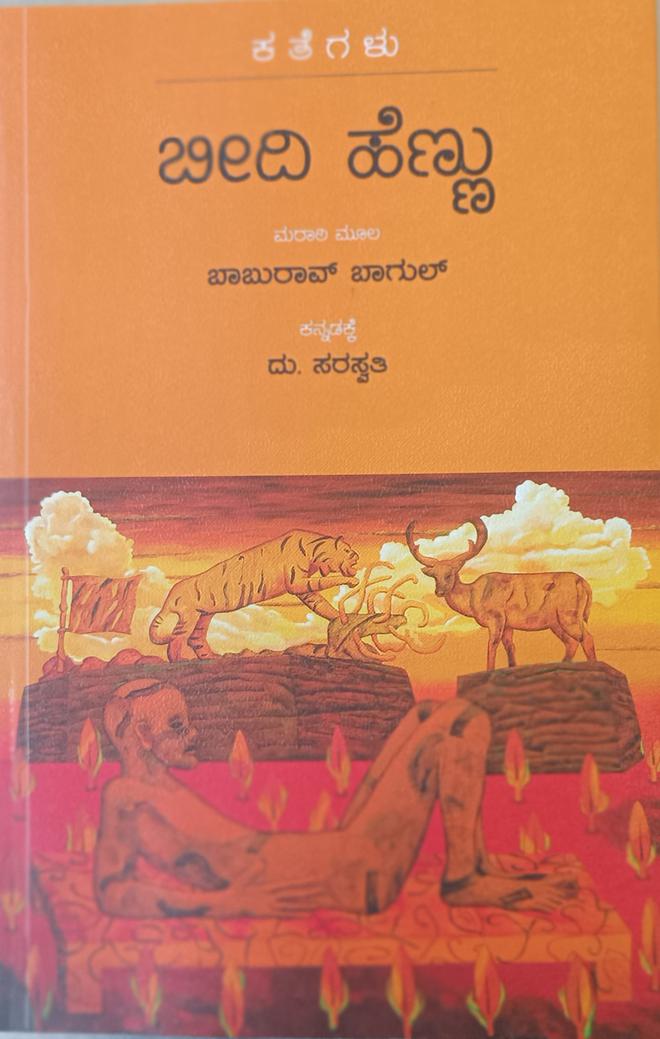Du. Saraswathi sees herself as a writer and an activist in equal measures and perceives no dichotomy between the two. A human rights and Dalit activist and a vocal feminist, she is also a writer, poet, playwright and actor. Her Ph.D. work is on the pourakarmikas of Bengaluru who toil to keep cities clean but never get recognition as entitled citizens. In fact some of Saraswati’s best stories reflect the lives of these underpaid and unrecognised workers of the city.

Saraswathi’s recent work Beedi Hennu is a translation of Marathi author Baburao Bagul’s groundbreaking work, Jevha Mi Jaat Chorli Hoti, gives voice to marginalised sections. Bagul’s collection of short stories, first published in 1963, revolutionized not just Dalit literature but left an indelible mark on Marathi and Indian literature. It brought forth an unfiltered, raw reality over the harsh truths of societal structures. The Kannada translation was launched recently in Bengaluru.
In an interview with The Hindu Saraswathi spoke about her journey as a writer, translator and activist and said that all she dreams of now is happiness and equality for everyone in society.
Your recent book Beedi Hennu is a translation of Baburao Bagul. You have translated many books in the past, how was your experience translating this particular book?
Translation is something that is indispensable in my life. From judgements, reports, scripts, poems, to books, almost every content comes out in English, and I am forced to translate. My intention is to make sure all of this reaches people of all walks of life, which is why I translate it to Kannada. I can not say that translating this book was a pleasant or good experience; It shocks you, pains you, and pierces you. So, it was quite an intense process for me translating this book, I underwent the same pain Buburao had undergone as a Dalit writer.
The title of the book in Marathi (Jevha Mi Jaat Chorli Hoti) and English (When I Hid My Caste) are very different from the Kannada title. Why the title Beedi Hennu?
The title of the book was chosen by the publisher. I had many other titles in mind for the book, however, each story in the book is so strong and hard hitting that it gets difficult to find a title, which is why I let the publisher take a call. I am also very fond of the English title – When I Hid My Caste. It may sound dry and not very poetic, but it speaks about an aspect of the Dalit life and it is still very relevant.
How different is this book from books of other prominent Dalit writers?
Baburao Bagul is one of the Dalit authors who also comes from a political movement. He is someone who has witnessed India both pre- and post-Independence, and the changes in the caste system during this period. I had read a review of a story written by Baburao and started looking for it. In the process I came across this book. Though I did not find the story, this book got me hooked. His feminist perspective and Dalit aesthetics is what makes him very different from other writers.
There are references to Bhangis/Pourakarmikas in this book. You have worked very closely with Pourakarmikas, especially women in the field. What has that experience been like?
Just like in the story in the book, I have come across some terrible experiences they go through. I was asked to lead a group for Pourakarmikas by the government and witnessed some things which I had never imagined I would do. I have been working with Pourakarmikas for a very long time now and still feel I have not done enough for them.
What is it like to be both a creative writer and an activist? How do these two elements blend, do they ever interfere with one another?
Both are reciprocal and influence one another. Activism adds weight to my creativity, and my creative side helps me balance my activism. These two elements are mutual and blend so very well. Activism and writing have helped me grow as a person and helped me become a better human being.
You have been an activist, a writer, poet, theatreperson and a lot more for more than three decades. What would you like to reflect upon when you look at your journey?
Activism, theatre, poetry, writing... all of this is a part of my life, and I can not separate these elements. However, I had never imagined that I would become an activist or an author or a poet, it just naturally became a part of me. Whatever I am today, the credit goes to the movements I have been a part of. Despite being able to work in so many fields, the fact that I am a Dalit remains as a tag. People assume I work as a Pourakarmika myself, but I am not ashamed, and I am proud to be associated with the community. Looking back at my journey, all I dream of now is happiness and equality for everyone in society.







